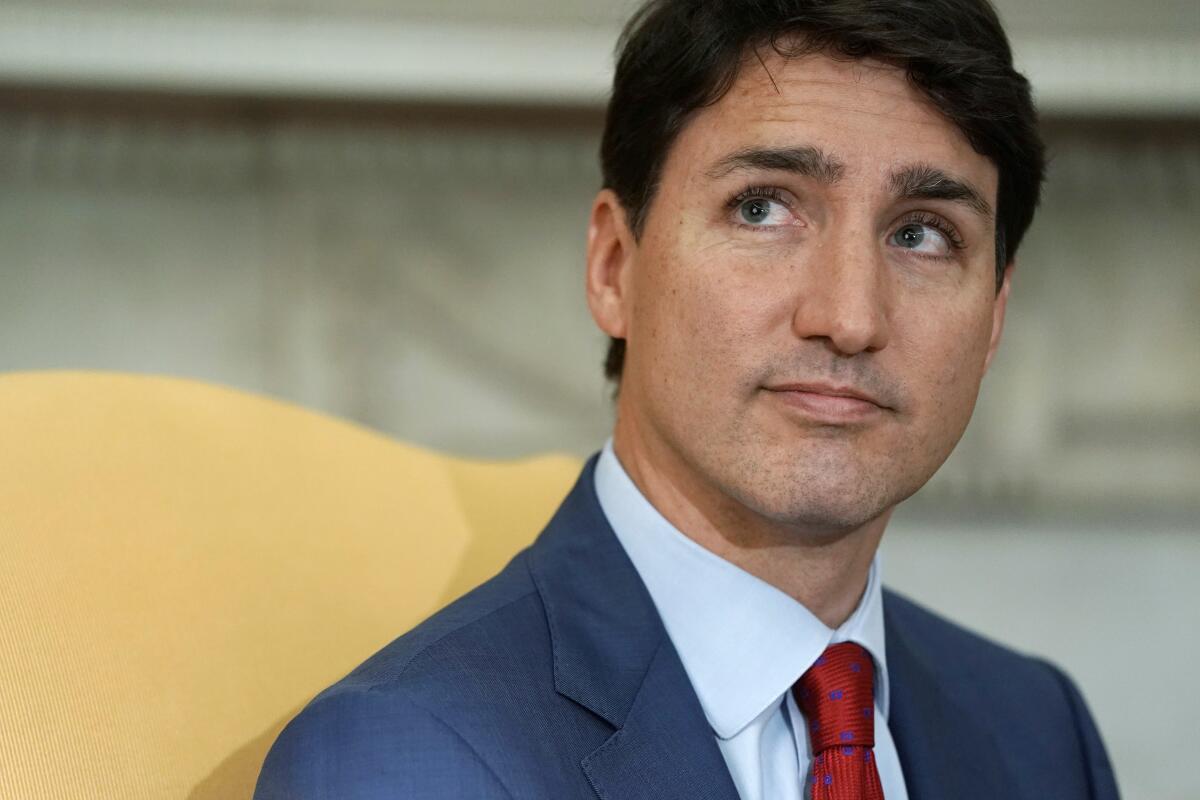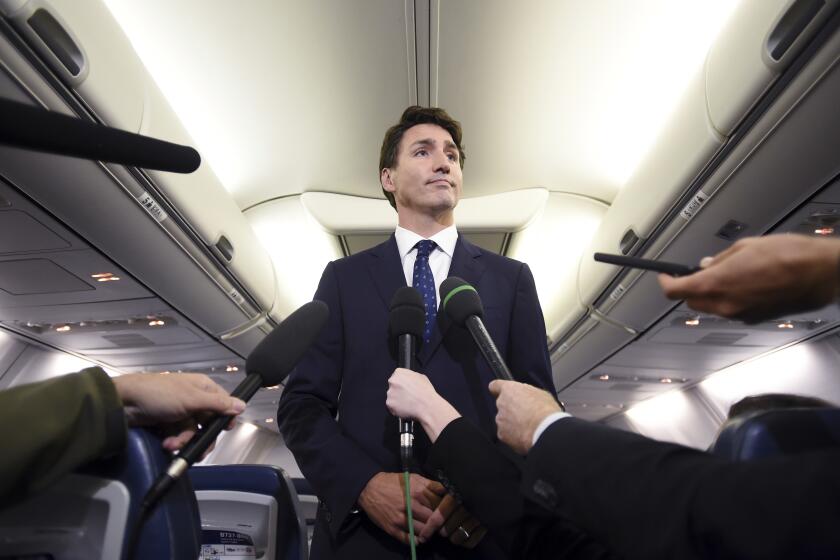Canada’s Justin Trudeau says he’s evolved since wearing brownface. Will voters accept that?

- Share via
MONTREAL — For his entire life in politics, Justin Trudeau has practiced identity politics in a country that prides itself on embracing minorities and welcoming immigrants. But now Canada’s prime minister is in grave danger of being defeated by identity politics in a short election season disrupted by images of him in blackface and brownface.
With nationwide attention on the 47-year-old Trudeau’s past amid a campaign focused on Canada’s future, publication of the images has raised disturbing questions about the authenticity of his commitment to diversity and the depth of his avowed convictions.
The scandal broke on Wednesday, when Time magazine published a photo taken at a 2001 “Arabian Nights” costume party at a school where Trudeau worked, showing him in a turban and robe with dark makeup on his hands, face and neck. He was 29 at the time, a former snowboard instructor turned schoolteacher. After Time published the photo, a video surfaced of Trudeau in blackface, apparently sometime in the 1990s.
New images are emerging of Canadian leader Justin Trudeau in brownface and blackface makeup at costume parties just as he faces a crucial election.
Never in Canadian politics has a jolt remotely like this one transformed a campaign with a mere four weeks before voters go to the polls. And this challenge to Trudeau’s leadership, character and political survival comes at a time when social media contagions have the potential of wreaking damage unimaginable in earlier election contests in a vast, continent-wide country united by a tradition of civil, almost genteel, politics.
In a series of admissions and apologies, explanations and exhortations, that has consumed nearly a tenth of the formal campaign season, Trudeau said that the figure with the darkened face is “not the person I’ve become.” His Conservative rivals and some skeptics in Liberal Party circles had already been asking, sotto voce, who exactly that person was.
Now that question, asked about a son of former Prime Minister Pierre Elliott Trudeau, is on the lips of voters from Newfoundland and Labrador to British Columbia.
“There’s discomfort with the Trudeau dynasty, with his privilege, with the standard that Trudeau appears to set,” said Drew Fagan of the Munk School of Global Affairs at the University of Toronto, who has worked in government for both Conservative and Liberal ministries. “There’s a contrast between the rhetoric and the reality, and in a situation like this there is a perception that he would have treated people differently from the way he wants to be treated.”
But as revealing as this episode is about Trudeau, it may tell even more about Canada and its brand of politics, so different in tone, substance and pace from its North American neighbor.
“We in Canada like moral political leaders, but we don’t like moralizing,” said Peter Donolo, who was communications director for former Prime Minister Jean Chretien — like Trudeau, a member of the Liberal Party. “We like virtue but we don’t like people who act as if they have more virtue than others. We like the fact that Trudeau is ‘woke’ and metrosexual — in touch with his feminine side — but we don’t like the aftertaste of the notion that if you don’t think the way he does, you are almost not worthy.”
Trudeau, who in his new, unfamiliar defensive posture cited his own “layers of privilege,” is in part a victim of his own success, for the international approbation that he has experienced — especially in his contrast with President Trump and, more recently, British Prime Minister Boris Johnson — may seem pleasing abroad but is oftentimes displeasing at home. The August 2017 Rolling Stone cover (“Justin Trudeau: Why Can’t He Be Our President?”) did not win universal approval above the 49th parallel.
At least three earlier prime ministers discovered this very combination of foreign praise and domestic vulnerability at their peril. Trudeau’s late father (who served from 1968 to 1979 and 1980 to 1984) was criticized for his hip image abroad, Brian Mulroney (1984-1993) faced skepticism for living the high life and striking up friendships with Presidents Reagan and George H.W. Bush, and Lester B. Pearson (1963-1968) found that his Nobel Peace Prize did him little good at home.
Justin Trudeau’s emergence as a party leader earlier this decade, and his election as prime minister, came as Canada deepened its commitment to diversity. Indeed, as Trump and others in the U.S. sharpened their criticism of American immigration policies, Trudeau and Canadians deepened their commitment to relatively open borders, especially as regards migrants from Syria. And while racial issues have in the last two years broadened divides in the United States, Trudeau and Canadians have promoted a rhetoric of inclusion so pervasive and so persuasive that the appearance of the young Trudeau in blackface and brownface was especially discomfiting.
Canadian Prime Minister Justin Trudeau’s campaigning for national elections has been hit by the publication of a yearbook photo showing him in brownface makeup at a costume party in 2001.
Even Trump, no admirer of Trudeau, pronounced himself “surprised” in comments to reporters Friday during an Oval Office meeting with Australian Prime Minister Scott Morrison.
Canadians, to be sure, are accustomed to identity crises with regard to their southern neighbor. Indeed, perhaps the best way to identify the Canadian in a crowd is to assert in conversation that the two countries are basically the same and watch which listener squirms.
But Canadians are less accustomed to questioning their sense of themselves at home. In his magisterial 1,100-page history of Canada, “Rise to Greatness,” the publisher Conrad Black speaks of his native country’s “original and effective way of managing through their unique and amorphous problems,” citing “endless good-faith discussion and the massaging around of the country’s ample resources, like a liniment to heal the lesions, done gradually and with such sincere verbosity that wounds healed and attention moved on to new problems susceptible to the same sort of treatment.”
The Trudeau imbroglio has consumed enormous amounts of airtime. Conservative leader Andrew Scheer, Trudeau’s principal rival, and New Democratic Party leader Jagmeet Singh each sought to deplore the prime minister’s hypocrisy and scramble for his supporters while promoting the notion that the prime minister known for his “sunny” personality — the term inevitably appears in profiles of him — is in eclipse. But there remained the notion that while the prime minister may be immature and lacking in seriousness and sound judgment, he may survive this challenge.
The overriding political questions are whether the sheen has been removed from Brand Trudeau, so intertwined with his image as a virtuecrat and his embrace of identity politics, and how this episode will affect voters not inclined to side with Scheer’s Conservatives. If those voters migrate from the Liberals to the New Democratic Party of Singh — a Sikh who said in a CBC interview that Trudeau “mocks people because of the color of their skin” and is “someone who humiliates people who are suffering” — or to the Green Party, Trudeau could be in trouble. As it is, a recent nationwide poll — conducted before the brownface scandal — showed that Trudeau was viewed negatively by 63% of respondents.
Still, just a week ago, Josh Freed, a Montreal Gazette commentator, wrote a column deploring the lack of excitement in the election just underway in what he called “no-drama Canada.” No one is making that critique today.
Shribman is a special correspondent.
More to Read
Sign up for Essential California
The most important California stories and recommendations in your inbox every morning.
You may occasionally receive promotional content from the Los Angeles Times.












